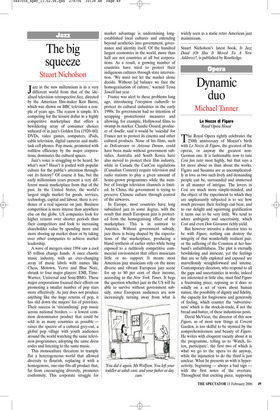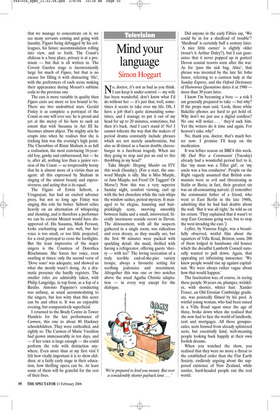Dynamic duo
Michael Tanner
Le Nozze di Figaro Royal Opera House The Royal Opera rightly celebrates the 250th anniversary of Mozart’s birth with Le Nozze di Figaro, the greatest of his operas, or anyway the greatest nonGerman one. It is fashionable now to rate Cos! fan tutte most highly, but that says a lot more about us than about the works. Figaro and Susanna are as uncomplicatedly in love as two such lively and demanding people can be, surrounded and immersed in all manner of intrigue. The lovers in Cos! are much more simple-minded, and the object of the experiment to which they are unpleasantly subjected is to see how much pressure their feelings can bear, and to our delight and squirming gratification it turns out to be very little. We tend to adore ambiguity and uncertainty, which Cos! and even Don Giovanni richly yield.
But however intrusive a director tries to be with Figaro, nothing can destroy the integrity of that wonderfully resilient pair, or the suffering of the Countess at her husband’s unfaithfulness. The plot is eternally bewildering and intricate, yet the feelings that are so fully explored and exposed are marvellously straightforward and intense. Contemporary directors, who respond to all the gaps and uncertainties in works, indeed are interested in little else, must find Figaro a frustrating piece, reposing as it does so solidly on a set of views about human nature, the possibility of dignity and fidelity, the capacity for forgiveness and generosity of feeling, which counter the ‘subversiveness’ which is the stock-in-trade, if not the bread and butter, of these industrious pests.
David McVicar, the director of this new Figaro, as of most new things at Covent Garden, is too skilful to be stymied by the comprehensiveness and beauty of Figaro. He writes with eloquent vacuity about it in the programme, telling us to ‘Watch, listen, participate’, the first two of which is what we go to the opera to do anyway, while the injunction to do the third is just unclear. What he presents us with is hyperactivity, beginning — always a bad sign with the first notes of the overture. Throughout that exciting piece, supposing that we manage to concentrate on it, we see many servants coming and going with laundry, Figaro being debagged by his colleagues, his future accommodation rolling into view, and so forth. The Count’s château is a busy place, privacy is at a premium — but that is all written in. The Covent Garden stage is inconveniently large for much of Figaro, but that is no excuse for filling it with distracting ‘life’, with the performers of each scene making their appearance during Mozart’s sublime coda to the previous one.
The cast is more variable in quality than Figaro casts are more or less bound to be. There are two undoubted stars. Gerald Finley is as complete a portrayal of the Count as one will ever see: he is proud and yet at the mercy of his lusts to such an extent that with Susanna in Act III he becomes almost abject. The mighty aria he erupts into when he realises that she is tricking him was the evening’s high point. The Cherubino of Rinat Shaham is as full a realisation, the most convincing 16-yearold boy, gawky and embarrassed, but — he is, after all, nothing less than a junior version of the Count — so irrepressibly horny that he is almost more of a victim than an agent: all this expressed by Shaham in singing of the utmost beauty and expressiveness, and acting that is its equal.
The Figaro of Erwin Schrott, a Uruguayan, has had an excited advance press, but not so long ago Finley was singing this role far better. Schrott relies heavily on an alternation of whispering and shouting, and is therefore a performer we can be certain Mozart would have disapproved of. His Susanna, Miah Persson, looks enchanting and acts well, but her voice is too small, or too little projected, for a vivid portrayal to cross the footlights. But the least impressive of the major singers is the Countess of Dorothea Röschmann. She forces her voice, even snarling at times; only the second verse of ‘Dove sono’ was adequate, and showed us what she mostly wasn’t doing. As a dramatic presence she hardly registers. The smaller roles are admirably taken, with Philip Langridge, in top form, as a fop of a Basilio. Antonio Pappano’s conducting was unfussy, as usual accommodating to the singers, but less witty than this score can be and often is. It was an enjoyable evening, but comparatively superficial.
I returned to the Brady Centre in Tower Hamlets for the last performance of Carmen, this one to about 80 Hackney schoolchildren. They were enthralled, and rightly so. The Carmen of Marie Vassiliou had grown immeasurably in ten days, and — if her voice is large enough — she could perform the role with distinction anywhere. Even more than at my first visit I felt how vitally important it is to show children, at a fairly early stage in their education, how thrilling opera can be. At least some of them will be grateful for the rest of their lives.















































 Previous page
Previous page